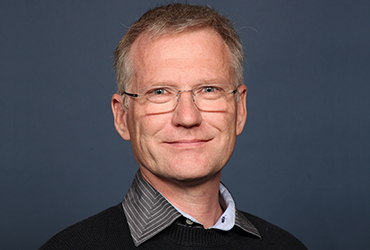How the AACR-Novocure TTFields Research Grant Opens Doors
What inspires you to pursue innovative research focused on Tumor Treating Fields (TTFields)?

Since my early studies of biology, I have been fascinated by tumor biology and especially the molecular alterations and signaling pathways driving cancer. As a molecular biologist, I was always seeking interdisciplinary research topics. I first heard about TTFields in 2014 at a European neuro-oncology conference. The fact that alternating electric fields (physics) can interfere with molecular processes regulating mitosis (biology) within a cancer cell (medicine) was of great interest to me, not only because of its interdisciplinarity, but especially because we just had published on mitotic dysregulation and its potential impact for glioblastoma therapy. This was the birth of our first TTFields-related project. Interestingly, while working on this initial project, we observed that TTFields may have the potential to open the blood brain barrier (BBB), which is the topic of the AACR-Novocure grant. However, this is only one side of the medal. Even more important for me, TTFields are the latest major improvement of glioblastoma treatment since the introduction of temozolomide in 2005. Recently, I lost a colleague and shortly after that, a dear friend to this devastating disease. Therefore, I have a very personal interest in striving to further improve the efficacy of TTFields by elucidating their mode of action.
In your view, what is the potential impact of the AACR-Novocure grants, and what does it mean, for you, to be a part of these grants?
As an international researcher originating from and working in Germany, I feel especially honored to be awarded this highly competitive, prestigious grant by the American Association for Cancer Research. I am very grateful that the AACR and the selection committee have confidence in my abilities as a scientist and the distinctiveness of the project. TTFields are a relatively new form of therapy and TTFields research by independent institutions has been limited in the past. The AACR-Novocure grants will encourage independent academic research groups to work on TTFields, broaden our understanding of their mechanism of action, and exploit new areas for their application. My clinical colleagues told me that glioblastoma patients appreciate it and are less skeptical about TTFields therapy if they see that successful TTFields research is done on-site.
What impact do you hope your research will have for patients who are treated with TTFields?
Transporting drugs from the blood into the brain is a major hurdle in modern medicine. I hope that our discovery that TTFields can induce the reversible opening of the BBB could lead to an innovative method of drug delivery for the treatment of brain tumors and other diseases of the central nervous system. The awarded project focuses on translating the lab data to future clinical application. At the end of the funding period, we hope to be in a position to conduct a phase I clinical trial.
Has your AACR-Novocure grant allowed you to pursue research that would not have been otherwise possible? If so, how?
Without the AACR-Novocure grant, this project would not have been possible altogether. The grant enabled us to strengthen the lab-team by employing a very gifted postdoc with outstanding knowledge of BBB function, who otherwise would have left us due to lack of funding. Also, we attracted a Chinese graduate student to work on her MD thesis at the forefront of TTFields research. I hope she will be able to join the lab once the current COVID-19 situation eases in 2021. The availability of experience in different fields and the combination of views from different perspectives and cultures will undoubtedly lead to innovations during the ongoing work on this project. In addition, grant funding to improve measuring devices and buy consumables is a prerequisite.
Besides, it is very difficult to find funding locally involving an industry partner like Novocure. The AACR-Novocure grant closes this gap and allows such collaborative research.
Please briefly describe the impact that an AACR-Novocure grant may have on the career of an awarded researcher. For example, additional funding, researchers interested in collaboration, etc.
I was awarded the AACR-Novocure grant in March 2020 with a start date of July 1st. So far, I have been supported through the grant for only half a year. I cannot yet foresee the impact this grant will have on my future career. However, my standing in the faculty has been improved because of this international grant. I was also offered membership as a supervisor at the local graduate school of life sciences. In addition, I have been contacted by international students interested in [conducting research] in my lab. Last but not least, I established international collaborations with colleagues working on TTFields at Stanford University and the University of Wisconsin.
What advice would you give to future AACR-Novocure grant applicants?
In 2019, I submitted an AACR-Novocure Discovery Grant application on a different topic involving TTFields, which was not selected for funding. My advice is to not give up in such a case. Do not hesitate to apply for an AACR-Novocure grant, even a second time, with a similar or different project. It is worthwhile. If available, consider the reviewers’ comments for the next application. Have a good, reasonable, and distinctive idea, and ideally, show some convincing preliminary data.
What is your vision for the future of TTFields research?
TTFields have much potential beyond glioblastoma treatment. This has been shown by ongoing clinical trials on a multitude of different cancer entities and by our observation of TTFields’ influence on the BBB. However, there are still topics that require further elucidation, such as the mechanism of action, combinations of TTFields with different drugs, why some patients respond better than others, TTFields effects on immune function, and a combination or variation of different TTFields frequencies to better target cells of varying size or combining effects caused at different frequencies. I am convinced that the AACR-Novocure grants will help improve TTFields knowledge and its application to treatment, and will eventually benefit patients.